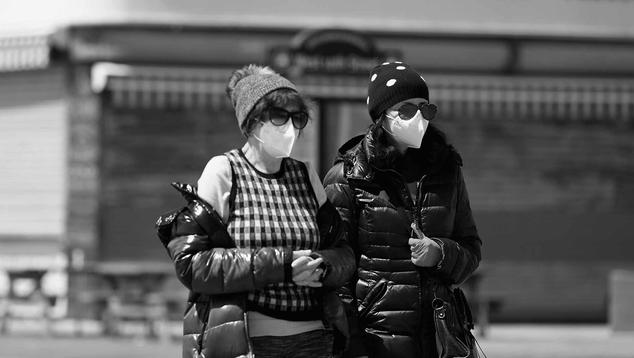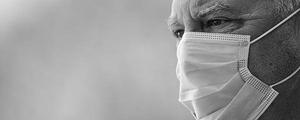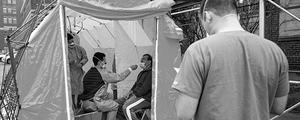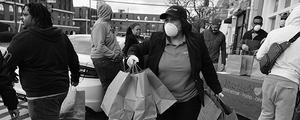Story Highlights
- Index falls from +22 to -32
- More now rate current economic conditions negatively than positively
- Perceptions of job market tank
WASHINGTON, D.C. -- Americans' evaluations of the economy have abruptly turned negative amid the coronavirus pandemic. Gallup's Economic Confidence Index is now -32, down from +22 in March.
The 54-point drop is the largest one-month change in Gallup's trend dating back to 1992, and it comes on the heels of last month's 19-point drop, which had been one of the largest monthly declines to date.
Just two months ago, economic confidence was the highest it had been in 20 years.
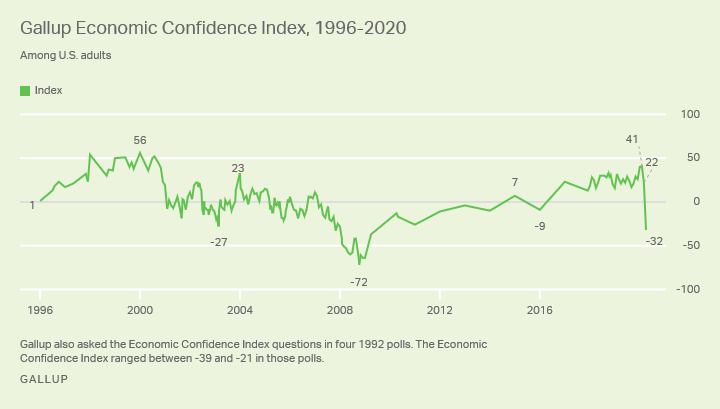
Although the current figures represent the largest short-term decline, economic confidence remains higher now than it was during the Great Recession. The Economic Confidence Index was -72 in October 2008, just after the financial crisis started. The index has a theoretical range of +100 to -100.
Over the past month, all party groups have shown steep declines in economic confidence, but Republicans' drop has been the steepest. Since March, Republicans' index score has fallen 72 points, while the drop has been 50 points among independents and 37 points among Democrats.
In March, Democrats were already more negative than positive about the economy, but they are joined by independents this month. Republicans are still marginally more positive than negative about the economy, given their +5 index score.
| March 2020 | April 2020 | Change | |||||||||||||||||||||||||||||||||||||||||||||||||||||||||||||||||||||||||||||||||||||||||||||||||
|---|---|---|---|---|---|---|---|---|---|---|---|---|---|---|---|---|---|---|---|---|---|---|---|---|---|---|---|---|---|---|---|---|---|---|---|---|---|---|---|---|---|---|---|---|---|---|---|---|---|---|---|---|---|---|---|---|---|---|---|---|---|---|---|---|---|---|---|---|---|---|---|---|---|---|---|---|---|---|---|---|---|---|---|---|---|---|---|---|---|---|---|---|---|---|---|---|---|---|---|
| Republicans | 77 | 5 | -72 | ||||||||||||||||||||||||||||||||||||||||||||||||||||||||||||||||||||||||||||||||||||||||||||||||
| Independents | 12 | -38 | -50 | ||||||||||||||||||||||||||||||||||||||||||||||||||||||||||||||||||||||||||||||||||||||||||||||||
| Democrats | -21 | -58 | -37 | ||||||||||||||||||||||||||||||||||||||||||||||||||||||||||||||||||||||||||||||||||||||||||||||||
| Gallup's Economic Confidence Index combines respondents' assessments of current economic conditions and whether the economy is getting better or worse. It has a theoretical range of -100 to +100. | |||||||||||||||||||||||||||||||||||||||||||||||||||||||||||||||||||||||||||||||||||||||||||||||||||
| Gallup | |||||||||||||||||||||||||||||||||||||||||||||||||||||||||||||||||||||||||||||||||||||||||||||||||||
Gallup's Economic Confidence Index is a summary of Americans' ratings of current economic conditions and their perceptions of whether the economy is getting better or worse.
The April 1-14 poll finds 27% of Americans rating current economic conditions as "excellent" or "good" and 39% as "poor" (34% rate them as "only fair"). The net -12 current conditions score compares with nets of +43 in March and +54 in February.
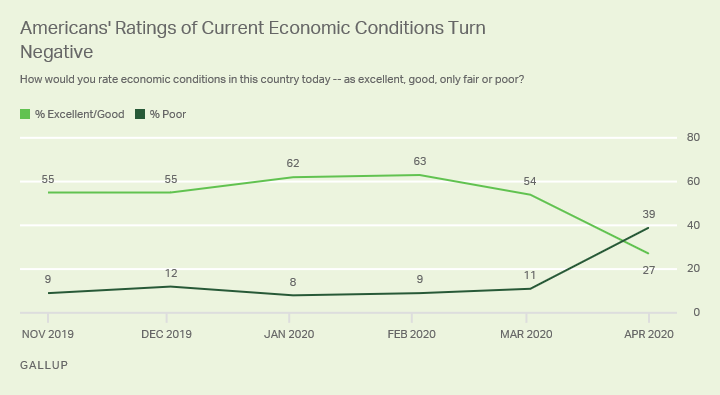
Americans' evaluations of the economy's current health are now more negative than positive for the first time since 2016.
Additionally, 74% of U.S. adults say the economy is getting worse, while 22% say it is getting better. Last month, when the coronavirus' spread was just leading states to consider enacting dramatic social-distancing practices, Americans were evenly divided on the economy's trajectory. In February, they were far more optimistic than pessimistic.
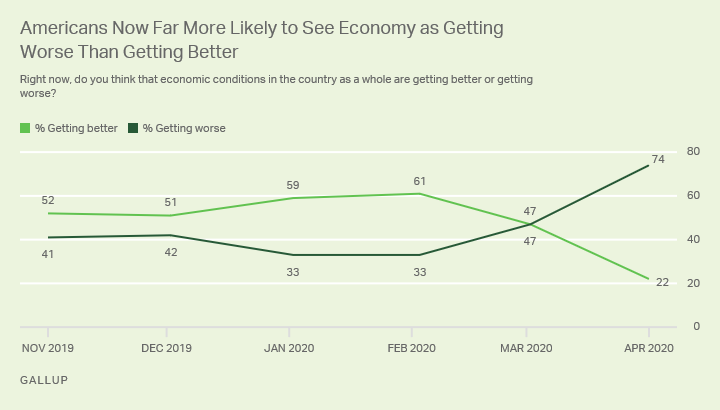
The 52-point gap in getting worse/getting better ratings is the largest since the Great Recession.
Americans Also Pessimistic About Local Business Conditions
The poll asked Americans how they would describe business conditions in their community, a question Gallup has asked periodically since 1961. Currently, 39% say local business conditions are "very good" or "good," while 36% say they are "not too good" and 23% believe they are "bad."
The 39% describing conditions as very good or good is the lowest Gallup has measured; the prior low readings were 41% in 1975 and 42% in 2011. Gallup did not ask this question during other challenging economic times, such as the late 1970s and early 1980s, or during the 2007-2009 Great Recession, so it is possible Americans' evaluations of local business conditions would have been worse then.
Job Market Evaluations Plummet
With more than 20 million Americans suddenly unemployed because of the coronavirus situation, 22% of Americans say it is a good time to find a quality job. This is down from 68% in the prior reading from January, which was only slightly off the trend's high point of 71% in May 2019.
The last time the "quality job" measure was lower than the current level was August 2013 (21%). It has been significantly lower in the past, including many single-digit readings during the Great Recession and ensuing periods of high unemployment.
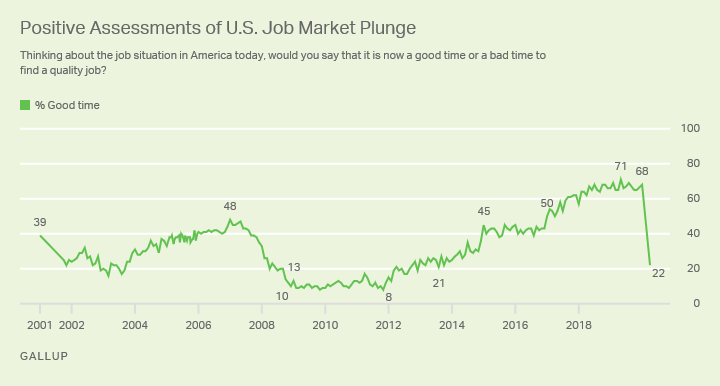
Implications
The coronavirus has caused sudden and unprecedented changes in U.S. society, and its harm to the economy is only beginning to be realized. Americans' confidence in the economy -- which had been the strongest since the dot-com boom -- has evaporated.
Still, Americans are not as pessimistic now as they were during the depths of the Great Recession. Whether confidence retreats to those levels or gets back on a more positive course will depend on how quickly society can approach a sense of normalcy.
Public health officials and elected political leaders are now devising plans for when and how economic activity can resume, but most are cautioning it will be a gradual process. This fits with Americans' outlook, with most wanting to see how conditions with the coronavirus evolve before resuming their normal activity, as opposed to doing so as soon as possible.
The official guidelines and public preferences toward a measured return to normal suggest the harmful economic effects of the coronavirus could persist for some time.
View complete question responses and trends (PDF download).
Learn more about how the Gallup Poll Social Series works.
